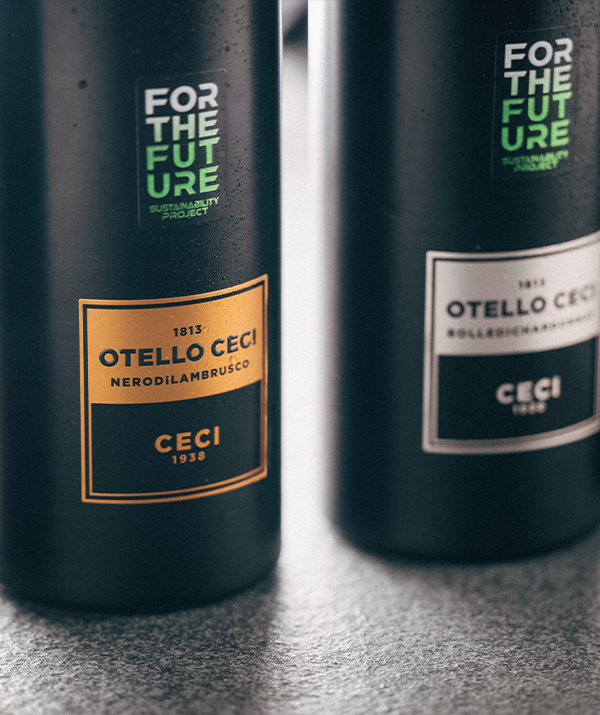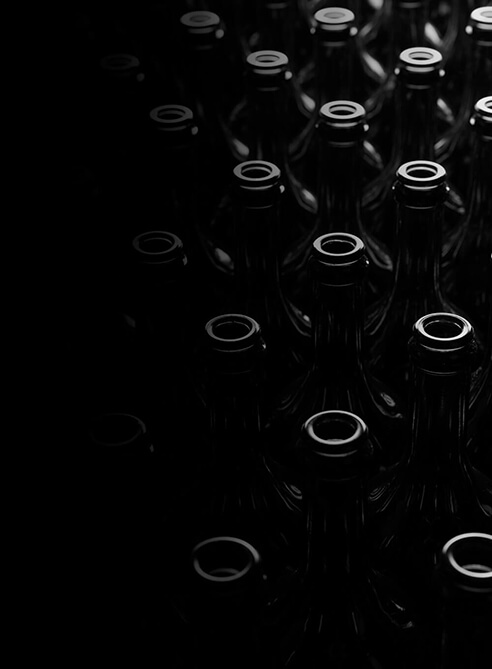Home » for-the-future
OUR DEDICATION TO THE ENVIRONMENT
“We firmly believe that the growth of our company must also be guided by a vision of responsibility, which considers our planet’s well-being. With this in mind, we adopted more sustainable business practices to reduce our environmental impact over time, and we look forward with trust, recognizing that any efforts in this direction can play an important role for future generations.”
Cantine Ceci was founded in the heart of the Lower Parma area, in Torrile, a land rich in tradition, nature, and conviviality. Protecting this heritage means acting responsibly on our part, which is why we have undertaken a genuine path to analyze, measure, and reduce our environmental impact. following the guidelines of the ISO 14001 international standard.
ISO 14001 guidelines. Our goal is clear: to produce wines of excellence with full respect for the territory that makes them unique. In 2023, we launched the “Otello Ceci for the Future” project, conducting a complete environmental diagnosis of our plant, wine life cycle, and related processes. In 2024, a path began to lead us to obtain the ISO 14001 environmental certification in 2025, allowing us to structure and maintain our improvement efforts over time.”
THE PEOPLE BEHIND OUR EFFORTS
To make all this possible, we have set up a dedicated organizational structure: organizational.
Maria Paola Ceci – Directorate and Environmental Policy
Elisa Maghenzani – Environmental Management Manager
Simone Baroni – Reference technician for the Environment
Paolo Monticelli and Vittorio Amati – Production managers
All company staff, from technicians to marketing, participate in this joint effort.
If you have any questions or comments regarding the environmental sector, please write to us at the dedicated address:
Our team is available to provide you with all the information you need and to collect your contributions

A CERTIFIED PATH
In 2024, a path began to lead us to obtain the ISO 14001 environmental certification in February 2025, allowing us to structure and maintain our improvement efforts over time. We have identified all direct and indirect environmental impacts related to our business, such as the consumption of natural resources (energy, water, gas), emissions into the atmosphere, water discharges, waste production, and noise pollution, as well as indirect impacts affecting the life cycle of materials and packaging, transport, and the management of suppliers and subcontractors.
Every impact has been addressed with targeted actions: from the choice of eco-friendly products to the optimized management of waste, from the reduction of consumption to the periodic plant maintenance. Our wine is the result of an articulated cycle, from the vineyard to the bottle, passing through the cellar, distribution, and consumption. At each phase we are committed to reducing waste and enhancing all resources, including processing residues, according to the principles of the circular economy.
For The Future Sustainability Project
“For The Future” is Cantine Ceci’s innovative Sustainability Project that combines a passion for quality winemaking with a real commitment to sustainable production.

Cantine Ceci S.p.A. intends to decrease the impact of its processing and supplier chain on the area by supporting extensive and ongoing monitoring of its environmental performance and by closely adhering to legal requirements.
For a winery, the most sensitive issue is how best to use its resources, which translates into taking practical steps to monitor and control consumption, waste, production residues, and waste generated during a product’s life cycle.
Water is heavily used in wineries for all cleaning and sanitizing purposes. The initial internal step was to concentrate on quantifying water consumption—both from the network and from wells. The first step was to install detection systems, either manual or automatic meters, in the various winery areas and analyze the amount of water used in the actual “balance” of wine production to determine where, in which phases, processes, operations, and times of the year, the highest consumption is concentrated.
Measuring and cross-sectioning the various departments to identify the most energy-intensive ones so that action can be taken on the most important ones was done using the same methodology on the electricity and methane gas lines.
SOME NUMBERS
From an energy perspective, a photovoltaic system helps us generate one-third of our electricity. We have also installed a charging station for electric cars, available to our customers and employees.
Since packaging contributes more than 30% of the environmental impact of the finished product life cycle, it is another especially important component of our processing cycle.
Keep in mind that Italian consumers are becoming more and more concerned with environmental issues when making food purchases. In the past year, 54% of our citizens switched to a brand with more environmentally friendly packaging, and 18% stopped purchasing a product because of its unsustainable packaging,
according to comments of Emanuele Di Faustino, Nomisma’s director of Industry, Retail, and Services.

OUR IMMEDIATE GOALS FOR A SUSTAINABLE FUTURE:
REDUCE WATER, ELECTRICITY, AND GAS CONSUMPTION
After monitoring the most critical points
REDUCE
WASTE
INSTALL A NEW PHOTOVOLTAIC SYSTEM
To achieve nearly 100% energy efficiency
ADOPTING A PACK WITH GREAT QUALITIES FOR SUSTAINABILITY
ALU Bottle For The Future
This is the firm commitment for the next 3 years that will enable us to achieve Certification of our Environmental Management System according to the international standard ISO 14001 and other extraordinary achievements.






